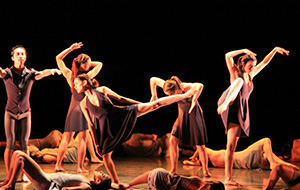 Whilst exercise is renowned for its stress-busting and happiness-inducing benefits, the same benefits of dance are sometimes overlooked. There are the obvious physical benefits of dance, in that it keeps the body fit and healthy, encouraging strong, lean muscle mass and a good range of flexibility, another valued strand of overall fitness. Often the mental benefits of dance – and exercise – are focused on less, however they have just as much value for the body, mind and wellbeing.
Whilst exercise is renowned for its stress-busting and happiness-inducing benefits, the same benefits of dance are sometimes overlooked. There are the obvious physical benefits of dance, in that it keeps the body fit and healthy, encouraging strong, lean muscle mass and a good range of flexibility, another valued strand of overall fitness. Often the mental benefits of dance – and exercise – are focused on less, however they have just as much value for the body, mind and wellbeing.
Dance is a surefire way of escaping the realities of the everyday, a welcome distraction from the stresses of life. Dance may come with its own stresses, such as cleaning choreography or remembering a new variation, however these are minor in comparison to the amount of joy dance brings. Experiencing stress can have a damaging effect on the body so dance and exercise can remedy this. As a result of dancing, the chemicals that are released into the brain help control how it deals with stress.
Similar to some forms of exercise, dance falls under the umbrella of moderate to high intensity aerobic workouts, with added style and artistry! This can help reduce feelings of anxiety as a result of the boost to the brain we experience through dance, improving the brain’s functioning and performance, as well as stimulating the development of new brain cells. Dance does not just aid young, aspiring students: here it is clear that older dancers will too reap the benefits of dance slowing the deterioration of key parts of the brain. Dance makes the brain’s neurones stronger and more efficient, aiding learning and memory.
Overall dance makes its participants happy. As the ultimate mental benefit, using the body in such a way, focusing on the self and forgetting everything else means the chemicals created in the brain through dance lead us straight to happiness. Exercising or dancing for just 30 minutes a few times a week can instantly boost your mood and make you happier.
